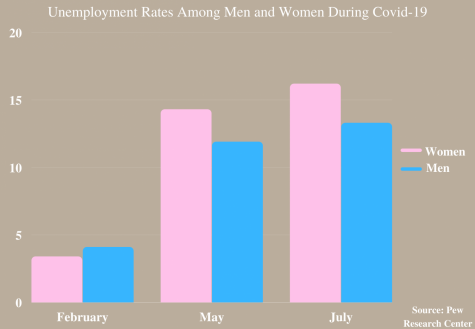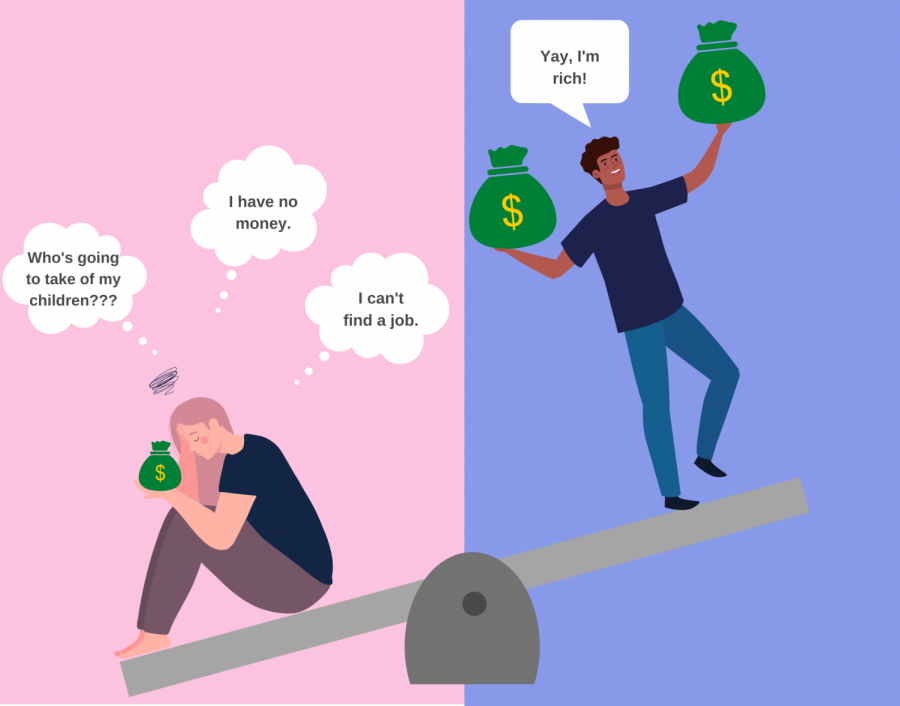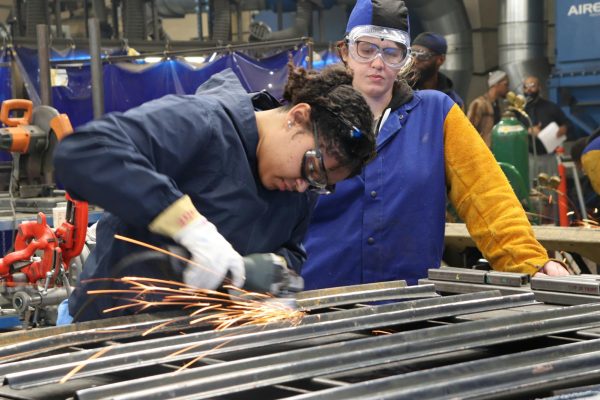Pandemic drives women farther from gender equality
This past year has really been the year of disparity all across the nation. Not only did we suffer a mass amount of racial disparities, but also an impactful disparity between men and women in the workplace. As the unemployment rate in May 2020 went as high as 16 percent, only 11.9 percent were men while 14.3 percent were women. As always, it does not come as a surprise that women are still facing the struggles of inequality, which has only continued to increase during this pandemic.
A little over a year ago, everyone was forced into quarantine causing thousands of people to become unemployed. As months went by and the virus was still very active, the number quickly changed from thousands to millions and we reached a rate that was never seen before. Unfortunately, the hardships that came from this crisis had a harder impact on women.
It’s been accounted that a majority of women worked jobs in the leisure, hospitality, and educational services sectors. These jobs were hit the hardest by the pandemic, as they were located in places that urgently shut down. With that being said, women accounted for more than 111 percent of jobs lost by December. This means that women lost 156,000 jobs overall during the month, while men gained 16,000 jobs.
“The impact on women of this crisis is going to be one that they feel economically for years to come,” explained Emily Martin, vice president for education and workplace justice at the National Women’s Law Center. “We’re really in danger of widening gender and racial wage gaps—and that has huge impacts for the financial security of women, and of the families who are depending on women.”
Unfortunately, a high percentage of these women being affected are women of color. Black and Hispanic women accounted for all the jobs lost in December; Black women being 8.4 percent and Hispanic women being 9.1 percent. Along with that, 154,000 Black women dropped out of the labor force entirely making it the largest one-month drop among that cohort since the pandemic started. This crisis has hit these two groups the hardest because they work in low-wage service sector jobs, which are easily disregarded as “unimportant”.
 On top of that, school and daycare closures have caused the responsibility of childcare and remote learning to fall more heavily on mothers than on fathers. With kids at home, it makes it harder for working mothers to tend to their children and provide them with the care that they need. According to a Washington Post article, one in four women reported becoming unemployed during the pandemic due to a lack of child care, which is twice the rate among men.
On top of that, school and daycare closures have caused the responsibility of childcare and remote learning to fall more heavily on mothers than on fathers. With kids at home, it makes it harder for working mothers to tend to their children and provide them with the care that they need. According to a Washington Post article, one in four women reported becoming unemployed during the pandemic due to a lack of child care, which is twice the rate among men.
“If you are in a low-wage service sector job, you’re not able to work from home and try to take care of your kids in between conference calls,” claimed Martin. “Those are jobs where, if you have a caregiving crisis, you may just have to leave the workforce entirely.”
Experts believe that a tremendous increase in caregiving responsibilities at home and at work may threaten women’s ability to stay in the workforce and progress in the future. Studies have shown that more women have progressively reduced their work hours, left work to care for their children, and generally spent more time on education and household tasks. Reductions in their work hours have been reported to be four to five times greater than the reductions arranged by fathers.
If this crisis continues, it could negatively impact the progress that women have been making for decades, and it will continue to exacerbate the existing inequalities. Even a 5 percent decline in the maternal labor force participation could undo those twenty-five years of progress. Along with that, if everything were to go back to normal, women would still have a very hard time finding work simply because they have been unemployed for so long.
“While the data are insufficient to give the full picture—and time will tell for certain—without congressional action, gender equity may be set back decades,” expressed the Center for American Progress. “This will hurt women, men, families, communities, employers, and the possibility of a true economic recovery. It’s time for Congress to act.”
Your donation will support the student journalists of Parkdale High School. Your contribution will allow us to cover our annual website hosting costs and publish some printed editions, as well.

It all started freshman year when baby Cecilia walked into Ms. G's English class. She was clueless and scared to start high school, but little did she...







